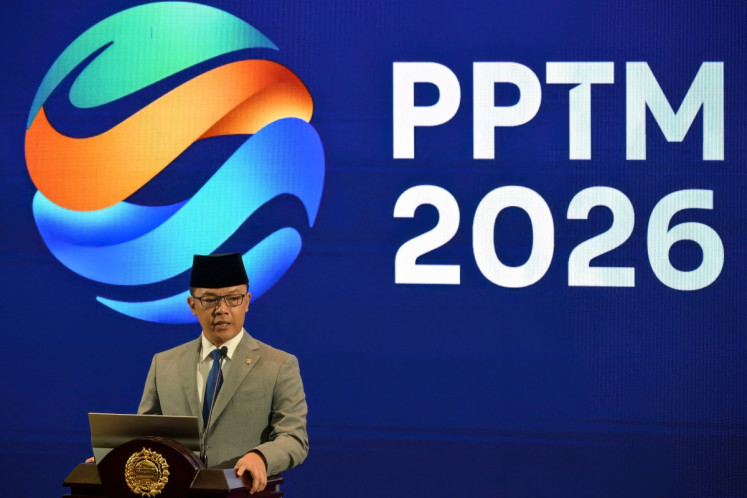Popular Reads
Top Results
Can't find what you're looking for?
View all search resultsPopular Reads
Top Results
Can't find what you're looking for?
View all search resultsAdmiring snapshots of life in rural Germany
The 5 Islands/5 Villages documentary film project lets the audience observe ways of life and depths of tradition in some of the more rural areas of Germany and Indonesia, through the eyes of 10 amateur filmmakers
Change text size
Gift Premium Articles
to Anyone
T
he 5 Islands/5 Villages documentary film project lets the audience observe ways of life and depths of tradition in some of the more rural areas of Germany and Indonesia, through the eyes of 10 amateur filmmakers.
The project is part of an exchange program organized by the Goethe-Institut and the University of Fine Arts of Hamburg (HFBK), in which the institute sent five Indonesian filmmakers to Germany for a few months to capture life in the country’s smaller towns, and five German students were sent to various Indonesian villages to do the same. Both groups were mentored by two German filmmakers, Pepe Danquart and Bernd Schoch.
“What the project aims to do is something cultural and reflective of Germany and Indonesia beyond the larger, more notable cities; basically, experiencing what they are experiencing in a raw manner,” Goethe-Institut Jakarta’s Southeast Asia regional director Heinrich Blömeke said.
The project will see the total of 10 films completed — and hopefully ready to be publically distributed locally and internationally — by the end of the year. The first segment, 5 Islands, which shows the German perspective of rural Indonesia, was already previewed in April.
The second segment, 5 Villages, was previewed on Thursday, giving a glimpse of the German countryside from the perspective of the five Indonesian filmmakers — Andrianus “Oetjoe” Merdhi, Wahyu Utami Wati, Bani Nasution, Tunggul Banjaransari and Rahung Nasution. The preview screening was part of the Arkipel International Documentary and Experimental Film Festival 2017.
Wahyu Utami Wati’s Maja’s Boat is a raw look into the life of a fisherman on the island of Pellworm, who struggles to make ends meet. Another film reflects on the state of the former coal mining town of Welzow in eastern Germany, titled Hantu Mekanis (Mechanical Ghost), where director Tunggul Banjaransari captures the quiet life of a town that once was part of Germany’s industrial machine.
The two aforementioned films feature the most straightforward pieces of small-town voyeurism, with few underlying messages beyond the subjects’ lives. Meanwhile, the three other films adopt political undertones related to Germany’s place in Europe today.
A particularly intriguing film in this project is Der Grenzganger by Andrianus Oetjoe Merdhi, which shows life in the small Lower Saxony town of Sumte and reflects on how people deal with the sudden arrival of Middle Eastern refugees into their town.
The premise was simple and obvious. In Der Grenzganger, the elderly German subjects of Sumte talk about their inability to engage or communicate with the refugees, mainly because of the language barrier. With the refugees came customs and actions that were alien to German small-town culture.
“I was one of the only ones that communicated with them, because they were housed near my place,” says an elderly, stocky man in the film. In the town’s refugee center, which is a converted office building, the same man would help the refugees adapt, for example by creating signs in Arabic.
There is a sense of loss in the atmosphere of the town when the refugees are gradually relocated to various places across eastern Germany. Now the office building stands vacant, leaving behind a slight melancholy through its emptiness and uselessness.
Bani Nasution’s Neutrale Strasse shows the town of Leidingen on the French border, with French citizens voting in a special polling booth for their presidential election of 2017. Even without any direct reference to France, it is clearly shown how the results of the French election, in which Emmanuel Macron defeated the populist Marine Le Pen, affects even Germany.
Beyond politics, the directors managed to capture the essence of German life in the countryside, which looks rather slow and easy when juxtaposed with the chaos occurring outside of their town or the country.
Rahung Nasution, the director of Bavarian Fragments, noted that on the day of his filming, May Day 2017, and in contrast with the big demonstrations happening in Berlin, the working-class people in the town merely went about their day as usual, happily drinking beer.
With his face tattoo, Rahung gives off an aura that might scare mild-mannered strangers, as shown in his film. But as it turns out, both sides felt the same way about each other: There was no fear, but curiosity and hospitality.
“I was experiencing some kind of culture shock, but then I realized that the residents were also feeling some form of culture shock from me, too. I realized that this culture shock could be used as a way to communicate with each other. So I built trust from there.”










